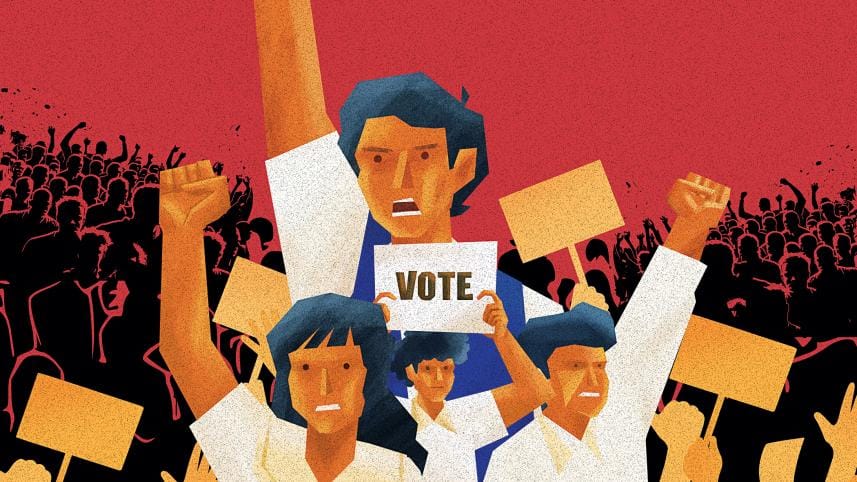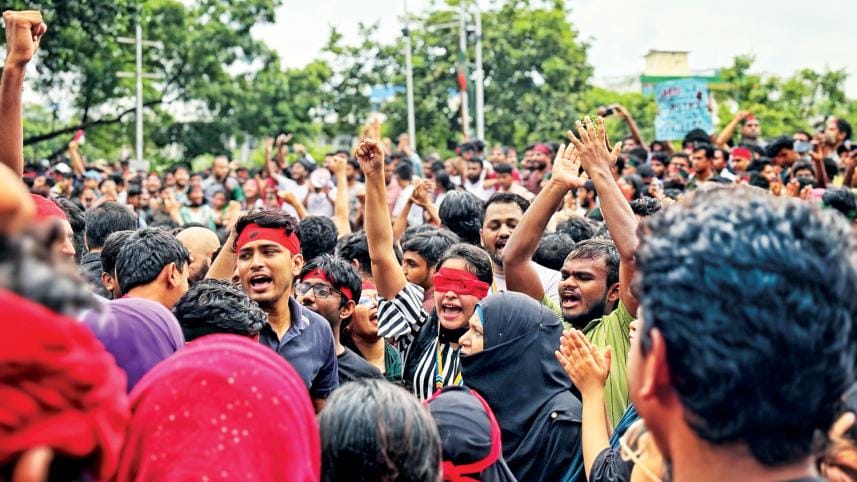Barriers to youth participation in politics and ways to overcome them

The youth have long been a driving force behind Bangladeshi political movements. From the language movement of 1952, liberation war of 1971, anti-authoritarian movement of 1990 which toppled the dictator Hussain Muhammad Ershad, and the recent July revolution of 2024 led to the fall of the dictator Sheikh Hasina, student-led mass movement, they have repeatedly proven their ability to stand up for justice, democracy, and change.
Despite their historical contributions, young people today––as they have always in this country—face significant barriers to political engagement. As Bangladesh enters a new political era in 2024, the need for active youth participation has never been more critical.
Why youth should step up in politics
The fall of the Awami League regime in 2024 has left a leadership vacuum in the political sphere, producing the urgent need for fresh and capable leaders. The youth, particularly Generation Z, are uniquely positioned to fill this gap. They have been at the forefront of the mass movement against autocratic governance, demonstrating their awareness of the country's political realities and their capacity to mobilise for change.
Nafiz Basher Alif, a 3rd-year student from the department of Public Administration at University of Dhaka, was critically injured on July 17, 2024, in his own campus. With a crutch by his side to walk, Nafiz said, "At this point, I want youth to step up in politics in Bangladesh. For the last 16 years, the last regime pushed dirty political narratives and propaganda towards the youth, and for that none of the youths felt an active disinterest in politics. But after the fall of the Awami regime, there is a lack of potential and good leaders who can take the responsibility of serving this country."
Engaging in politics in Bangladesh often comes with risks, including harassment, threats, and even violence. Student politics which was once a breeding ground for future leaders, has increasingly become associated with campus violence.
With the fall of the Awami league regime, an interim government led by Chief Adviser Muhammad Yunus was formed. The interim government's main agenda is to make critical reforms in all sectors and make policy changes to ensure a corruption-free society, and fair elections. However, many political parties have been constantly asking for upcoming national election dates in recent times. With a tentative election time frame announced, youth participation is now more vital than ever.
Tousif Tanzim Ahmed, an activist who was active in organising the youth during the July revolution said, "It is a long winter, but every winter brings opportunities for the summer. Many have been waiting for this chance, but it is not for them, yet they want to make it theirs. It is by promise for the future generations. And I can see the interim is working on its way to pave the political roadmap for Gen Z and millennials, and not for the crazy, and 'winner takes it all' parties who make it look like it was only their blood to begin with."
Key barriers to youth participation in politics
Cultural perceptions play a significant role in reinforcing these barriers in youth participation. Many families in Bangladesh discourage their children from pursuing political careers, viewing it as a risky or dishonourable path.
Engaging in politics in Bangladesh often comes with risks, including harassment, threats, and even violence. Student politics which was once a breeding ground for future leaders, has increasingly become associated with campus violence. This negative image discourages many talented and socially conscious youth from engaging with political organisations, fearing for their personal safety and reputational damage.
Shah Md. Shamrir Al-Af, a lecturer from the Department of International Relations at Bangladesh University of Professionals (BUP) said, "One of the most significant challenges is the pervasive political polarisation and archaic hierarchy that dominate the Bangladeshi political landscape, which often sideline fresh and youthful perspectives, stifle innovative ideas, and eventually discourage participation. Moreover, over the last two decades, the state of student politics has severely deteriorated from its once illustrious past, now mired with charges of corruption, violence, sexual assaults, and murder."
Shamrir added, "There is also a deep-seated lack of trust in political institutions, seen as corrupt, unresponsive, and either a collaborator to the previous regime or an equivalent, but not a better alternative, which further fuels political apathy among the youth."
Political parties in Bangladesh have long been dominated by senior leaders, many of whom prioritise loyalty over merit when selecting candidates or distributing responsibilities. This hierarchy creates a significant barrier for young individuals seeking to enter politics on the basis of fresh ideas or meritocratic credentials. Without established connections or influential backers, aspiring youth find it exceedingly difficult to secure meaningful roles within political organisations.
"Gen Z and many millennials who participated in the movement were thought to be among these anti-political or at best apolitical groups. Nonetheless, these were the same youths who brought down a totalitarian regime, fed up with a suffocating political situation. However, the lackluster performance of the interim government, despite the overwhelming support at its inception, the actions of a few other political parties are once again pushing many of these youths towards 'hating' politics," said Shamrir.

Corruption and the pervasive influence of money in politics further complicate the picture. The escalating costs associated with running for office or even participating in party activities often deter young individuals, particularly those from lower socio-economic backgrounds. In these cases, politics becomes an exclusive domain for those with access to wealth and resources, leaving the majority of honest youth on the periphery.
"As a matter of fact, sadly, the saying 'leaving Bangladesh is the biggest dream' has become popular among the disillusioned youth, highlighting the vast gap between their aspirations and the interest of the political parties and the reality of our socio-economic state," said Shamrir.
The education system also does little to prepare young people for active citizenship. Despite progress in expanding access to education, the curriculum often lacks emphasis on civic education, critical thinking, and leadership skills. This absence deprives young people of the knowledge and confidence needed to navigate the political landscape.
The government must prioritise job creation, particularly in emerging sectors, and invest in upskilling programs to equip young people for the modern workforce. Addressing unemployment will reduce emigration and inspire more civic participation.
The correct way forward in politics: Inclusion
Politics is inherently related with every aspect of life. As the youths are the torchbearers of the future generation, their voice and concerns need to be addressed politically to make proper policies and ensure that those policies have a realistic feasibility. In order to make conscious political arguments and practice, the youth need to develop historical and political knowledge to navigate themselves in this path. Current affairs, their implications and analysis are also a must.
Regarding this matter, the 30-year- old activist Tousif added, "Deshi youths are inherently apolitical and they want to know only through reading social media news. Only way to overcome this is please stop scrolling for news and read legit newspapers, make it your lifestyle."

The youth's skepticism towards political parties stems from broken promises and systemic issues. Nepotism, corruption, and abuse of power have eroded trust. To regain the trust of young people, political parties must prioritise accountability and transparency.
Emphasising the importance of political parties reforming their approach, Shamrir said, "Overcoming these barriers will be a laborious endeavor. Ensuring transparency and accountability in the operations and decision-making processes of major political parties should be the first step. Parties should welcome the voices of the youth. Platforms for dialogue, where youth can express their concerns and see their input reflected in policy, are vital. Parties must also focus on youth-centric policies directly tackling issues like education, job creation, and digital rights to demonstrate their commitment to the youth's future."
Comprehensive political education is essential for empowering young people. Civic education should be integrated into school curriculum, with workshops, debates, and mentorship programs that teach democratic principles. Political parties and activists can use social media to foster dialogue, disseminate credible information, and mobilise support.
Economic stability is a prerequisite for political engagement. The government must prioritise job creation, particularly in emerging sectors, and invest in upskilling programs to equip young people for the modern workforce. Addressing unemployment will reduce emigration and inspire more civic participation.
The role of youth in the July revolution and its aftermath demonstrates their eagerness and capability to shape the country's political future. However, this potential can only become a reality if political parties and institutions actively engage with and respond to the aspirations of the younger generation.
By addressing systemic challenges and creating avenues for meaningful participation, Bangladesh can harness the energy and vision of its younger generation. The stakes are high, but the potential is unparalleled—like the Cuban phrase "Patria o Muerte". "Homeland or Death".
Md. Zahidur Rabbi is a journalist at The Daily Star.




 For all latest news, follow The Daily Star's Google News channel.
For all latest news, follow The Daily Star's Google News channel.
Comments